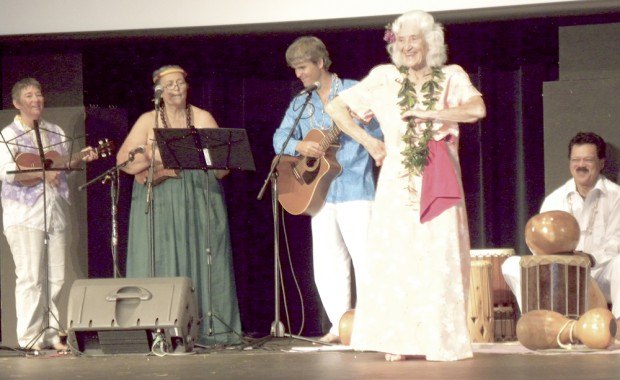Kumu Hula Puna e and Ka Ipu Ha‘a O Ke Kauilani Na Pua Hala o Kaua‘i, traveled to the historic Waimea Theater Tuesday night, Feb. 22, as part of Waimea Heritage Days, to share a program titled “In The Name
Kumu Hula Puna e and Ka Ipu Ha‘a O Ke Kauilani Na Pua Hala o Kaua‘i, traveled to the historic Waimea Theater Tuesday night, Feb. 22, as part of Waimea Heritage Days, to share a program titled “In The Name of Aloha.”
The program opened with two members of Ka Ipu Ha‘a playing the nose flute, one male and one female, symbolizing the balance of these energies. The stage lighting skillfully silhouetted the two, and the audience was transfixed as their breath gave life to the instruments.
The kupuna of the halau, Aunty Betty, then gave the translation and Jeremy called the oli. “We cannot exist without both energies, and so it’s balanced,” said Puna e. The importance of the balance between male and female energies was expressed to the attentive audience.
Glowing with a beautiful vibrancy that remained throughout the night, Puna e appeared on stage with an inviting smile and down-to- earth approach, which created an immediate relationship with the audience.
Puna e generously shared the meaning of each movement and mele that was to take place. It was a unique and special experience to receive knowledge and wisdom related to the mele, implements, and the progression of movement.
With great humility, Puna e said, “These haumana are students that I’m blessed to have. These women have been my confidant, aunty, mother, friend, and scold me when they need.” Buoyant laughter erupted and spread throughout the Waimea Theater like a warm blanket of joy. Humor contrasted the deep river of knowledge being shared, which created a balance in itself of light and depth.
“Having the youngest help finish your lei recognizes that you have kuleana for the haumana that come to you. People are gifts. They come at different times in your life and they always come with gifts,” said Puna e.
When answering a welcomed question from the audience regarding poetry in the Hawaiian language, Puna e said, “In the Hawaiian language there is no word of negativity. You would say ‘without aloha,’ not something negative to bash someone or something. You would just say ‘it’s without aloha.’”
“Aloha is being mindful of what is happening on the other side of the earth. It’s a prayer of intention, a prayer of thought, a smile, a kind gesture. It is people who are responsible for the gifts you are given. Be open to the gifts that come,” said Puna e.
Members of the audience were encouraged to reach out and share aloha with one another. People’s faces lit up with warm smiles with the opportunity to do so.
Aunty Betty danced a solo at the end of the program that was filled with charisma.
Puna e’s mother was part of a group of shamans who traveled the world to share this thought of aloha. Puna e comes from a lineage of kupuna including, and not limited to, Kaaiikawahakekauilani Correa Kalama, Hoakalei DeFries, Emma DeFries, Helen Pamaielulu DeFries Sham and Aunty Pilahi Paki.
After reflecting on the evening’s program with me, Puna e said, “All of our hula history comes from that area of Waimea to Haena, so it was an opportunity for us to give back and help to light our way. It is our intention that we can be a light that continues to burn and be a part of the community and the extended community.”
“In The Name Of Aloha” was a fluid, interactive, and thoughtful expression of hula imbued with spoken word given with grace. It was truly a gift for all who attended.


